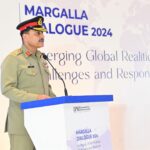ISLAMABAD, Pakistan: The Adviser to the Prime Minister on Foreign Affairs Sartaj Aziz has underlined that the indigenous movement of Kashmiris for self-determination in Indian Occupied Kashmir has entered a critical phase since the new wave started on July 8 last year.
While briefing a 20-member delegation of ‘Kashmir Journalist Forum’ on the grave human rights situation in Indian Occupied Kashmir at the Ministry of Foreign Affairs in Islamabad on Monday, and steps taken by the Pakistani government to sensitize the international community, the adviser said that the human rights violations perpetrated by the Indian occupation forces against unprotected Kashmiris in the Valley and precarious security situation due to Indian unprovoked ceasefire violations since July 8, 2016 alone should be an eye-opener for the International Community.
Sartaj Aziz said that over 150 mostly youth were martyred including many in extra-judicial killings and fake encounters by Indian forces in Occupied Kashmir while around 8,000 were affected by pellet guns that has blinded more than 250 youth either fully or partially with another 930 at the verge of losing their eye-sight.
The adviser said that 697 women were reported molested by Indian forces, around 18,000 injured and over 17,000 were arrested arbitrarily with their fate and welfare unknown.
Sartaj Aziz noted that despite Indian brutalities, on one hand, the enthusiasm for getting freedom from India’s unlawful occupation and sacrifices of Kashmiris especially the youth, has been rising and this phenomenon, on the other hand, has also defeated the Indian propaganda of down-playing the Kashmir issue as if there is nothing wrong. If there is nothing wrong then why there are over 700,000 fully armed Indian occupation forces stationed? Why the entire media has been blocked?
The foreign affairs adviser said that these are the questions that India should explain. Moreover, the current phase of the movement has also buried Indian propaganda of cross-border terrorism. The whole world is witnessing that it is a movement by unarmed indigenous Kashmiris youth. He mentioned Indian refusal to receive ‘Fact Finding Missions to Indian Occupied Kashmir’ by United Nations High Commissioner for Refugees (UNHCR) and Organization of Islamic Cooperation (OIC). He commended OIC’s strong statements condemning Indian atrocities in Indian Occupied Kashmir.
The adviser stressed that the two factors namely; undeterred movement for self-determination and its indigenous character have been receiving increased coverage of the international as well as Indian media. He said that voices expressing concerns and condemning Indian atrocities have echoed in various countries’ parliaments including Australia, European Union, North America, Nordic and the United Kingdom. Media and some members of the civil society made some useful and pertinent remarks. A Western media deplored that “there is no recorded instance of a modern democracy systematically and willfully shooting at people to blind them”. An Indian article reminded the Indian government that “the land of Kashmiris is with us, the people of Kashmir’s are not,” the adviser cited.
Despite the gravity of the situation on ground and persistent international pressure on India to resume dialogue with Pakistan with particular focus on Kashmir dispute, the Indian government has been trying to divert global attention from the situation in Indian Occupied Kashmir by heating up Line of Control (LoC) and Working Boundary.
Sartaj Aziz said that during last one year India has committed more than 450 unprovoked ceasefire violations. He said that these violations intensified after its fully armed forces in Indian Occupied Kashmir, world’s most militarized zone, could not deter the indigenous Kashmiri movement for self-determination.
The UN Secretarial General Antonio Guterres has expressed his concern over tension between India and Pakistan, called for a dialogue and offered to play role to help resolve Kashmir issue, the main bone of contention. Indian belligerent posturing and their desire to conduct dialogue on their own terms i.e. without Kashmir, will never be acceptable.
Sartaj Aziz said that in this background, India’s refusal to accept the role of the UN or good offices of the other leaders for reducing tension between India and Pakistan by resolving the Kashmir dispute reflects Indian desperation to hide its crimes against humanity in Indian Occupied Kashmir. Bilateral route had run in scores but without achieving much in substantive terms.
The foreign affairs adviser stressed that Kashmir is an internationally recognized dispute. There are UN Security Council Resolutions on Kashmir dispute that call for Kashmiris’ right to self-determination through a UN Security Council supervised plebiscite. Kashmir dispute is outstanding on the UN Security Council agenda. Pakistan wants to settle all contentious issues, particularly the Kashmir dispute with India through a sustained and result-oriented dialogue. Pakistan wants India to immediately stop bloodshed of innocent Kashmiris and create enabling environment for implementation of the UNSC Resolutions on Kashmir.
The adviser urged that the United Nations, OIC and Human Rights Organizations must step up efforts to stop the bloodshed of Kashmiris in Indian Occupied Kashmir and ensure early implementation of UNSC Resolutions.





